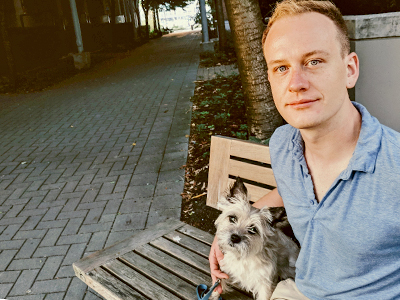
"I say yes to participating in research because otherwise we wouldn’t have the medications we have today. It’s about giving back."
– Michael Haack, Vancouver
During a routine trip to the dentist, Michael Haack was told that he had a white patch on his tongue. Haack did not have a history of mouth injuries or gum disease, so the news came as a surprise.
“My dentist told me that it resembled a freckle in my mouth,” explains the 28-year-old executive director of a local political organization. “He told me that it was an oral lesion, and that we would need to monitor it going forward.”
At the time, Haack thought little of the spot. However, over the next three years and three annual checkups, it progressed in size. His dentist ordered a biopsy and the results confirmed mild oral dysplasia—abnormal lesions, often white or red, within oral tissues that have the potential to develop into cancer.
“I couldn’t believe it,” Haack says. “I’m a young, healthy person. I wasn’t expecting that kind of news at all.”
Aggressive cancer with no progression prevention
Over 300,000 oral cancer diagnoses are made worldwide each year, including more than 50,000 cases in North America and approximately 500 cases in British Columbia, where numbers are projected to increase in the future. Due to the aggressive nature of the disease, the best line of defense is to stop it as soon as possible.
There is currently no accepted treatment available for mild or moderate dysplasia; however, Haack was referred to a clinical trial—conducted through Vancouver Coastal Health Research Institute—that prescribes metformin to patients with pre-cancerous oral lesions.
“This is the first really promising idea for how to prevent the progression of oral cancers,” says Dr. Denise Laronde, a co-principal investigator of the phase 2a metformin for oral cancer prevention clinical trial.
“This trial could give us our first line of defense against oral cancers, as no agreed upon treatment for low-grade pre-oral cancers currently exists.”
Fighting oral cancer tooth and nail
Haack and other participants in the clinical trial received a biopsy to confirm the presence of an oral lesion. They also provided blood and saliva samples and underwent a physical exam. Each participant received a regular dose of metformin for 12 weeks under the direction of clinicians. When their trial period was complete, participants had another biopsy and follow-up appointment.
The results of the study will help clinicians better understand whether metformin can prevent the progression of oral cancers and save patients from more aggressive treatment, such as surgery and other cancer treatments.

“With severe dysplasia, people will often receive surgery to excise the lesion,” says Dr. Laronde. “It’s important to find treatments while someone is still pre-cancerous to prevent further harm.”
Metformin has been used to treat patients with diabetes for over 50 years, and recent research shows that it can also prevent certain types of cancer, such as prostate and colon cancers. Clinical trials like this one provide new insights into and potential applications for repurposing this safe and effective prescription drug.

Haack will soon be studying towards a master of business degree and is an avid volunteer with the SPCA and Vancouver Pride Society. He says if the opportunity presents itself again, he would gladly participate in another clinical trial.
“I am really happy that I had the opportunity to play a small part in moving the process along,” says Haack. “I would definitely be interested in participating in the next phase of this trial or in a different one.”
Physicians and dentists may refer patients with mild or moderate dysplasia to the NextGen Clinic at: orca@bccrc.ca.
THIS IS ONE PATIENT’S STORY OF PARTICIPATING IN A CLINICAL TRIAL. YOUR EXPERIENCE MAY DIFFER. LEARN MORE ABOUT CLINICAL TRIALS BEFORE PARTICIPATING.


